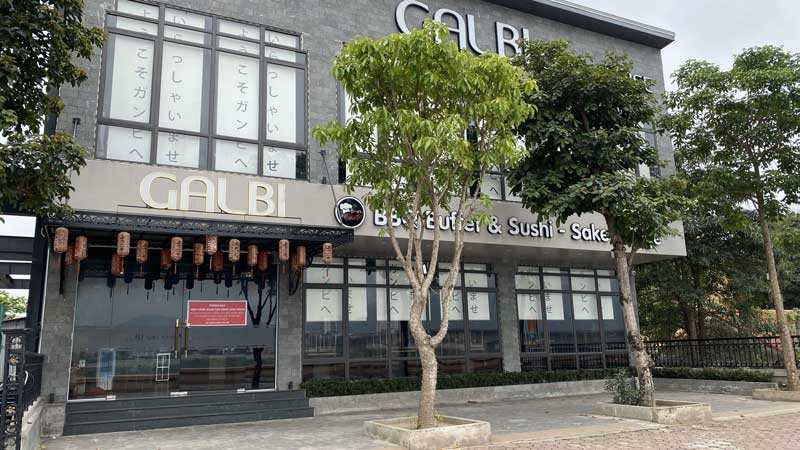
(HBO) - In light of the complicated developments of the COVID-19 pandemic, Prime Minister Nguyen Xuan Phuc has issued Directive No.15/CT-TTg on intensifying COVID-19 prevention and control, ordering cancellation of indoor meetings and events of more than 20 people and banning gatherings of more than 10 people outside offices, schools and hospitals, starting from 0:00 on March 28.
 Shops and restaurants on Da Giang Street in Hoa Binh city close doors
in compliance with the Prime Minister’s Directive.
Shops and restaurants on Da Giang Street in Hoa Binh city close doors
in compliance with the Prime Minister’s Directive.
As the capital of the province, Hoa Binh city has a large
number of shops, restaurants, café, karaoke clubs and fitness centres, mostly
located in the communes of Phuong Lam, Dong Tien, Tan Thinh and Huu Nghi. On
the first two days after the directive took effect, most of the shops and
restaurants suspended operation. Da Giang, one of the city’s busiest streets,
has become quieter than ever as all shops have closed, some even did it long
before the directive is issued.
Following the direct, governmental departments and agencies
in the province have cancelled many major events, like Party’s congresses at
grassroots levels, to avoid crowded gatherings. The districts have accelerated
communication campaigns to raise public awareness of recommendations made by
the Health Ministry and other authorities to contain the spread of the
coronavirus.
Meanwhile, the Vietnam Buddhist Shangha (VBS) has requested
its chapters nationwide to cancel all public religious services and events that
gather a large number of people to commemorate the Buddha’s Birthday, slated
for April 8.
The VBS has advised monks and followers to practice rituals
at their monastery and at home as part of the concerted effort to combat the
COVID-19./.
The Standing Board of the Hoa Binh provincial Party Committee has agreed in principle on a proposal by the Standing Board of the Party Committee of Hoa Binh city to gather feedback on the city’s 1:2000 zoning plan, which forms part of its broader urban development strategy.
Hoa Binh province has made notable progress in public administration reform and digital government development, with the satisfaction index among citizens and businesses reaching over 84%, according to recent government evaluations.
Thanks to great efforts by local authorities in recent times, the governance and public administration performance of Mai Chau district has been significantly improved.
In the afternoon of June 6, the Party Committee, the People's Council, the People's Committee and the Fatherland Front of Lac Son district solemnly held a meeting to celebrate the 139th anniversary of the district's founding (1886–2025) and the 79th anniversary of the establishment of the district's Party Committee (1946–2025). There was the attendance of Mr. Bui Van Thang, the Vice Chairman of the Provincial People's Council; Mr. Quach Tat Liem, the Vice Chairman of the Provincial People's Committee; Ms. Dang Bich Ngoc, the Deputy Head of the National Assembly Delegation of the province; as well as the former leaders of the province and district through various periods, who are the natives of the district.
Implementing the Politburo’s Resolution No. 57-NQ/TW on breakthroughs in science – technology, innovation, and digital transformation is a golden opportunity for the northern mountainous province of Hoa Binh to renew growth model, improve competitive edge and shorten digital gap.
Resolution 57-NQ/TW, issued by the Politburo on December 22, 2024, identifies sci-tech, innovation, and digital transformation as strategic breakthroughs to build a developed and prosperous nation. In Hoa Binh province, this spirit is not just a slogan, it’s being put into action through concrete initiatives that form a "new development triangle”: digital citizenship, digital economy, and digital administration.



 Shops and restaurants on Da Giang Street in Hoa Binh city close doors
in compliance with the Prime Minister’s Directive.
Shops and restaurants on Da Giang Street in Hoa Binh city close doors
in compliance with the Prime Minister’s Directive.